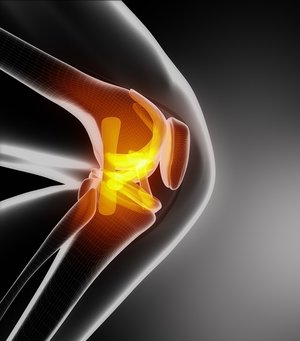Joint health is a major concern for an aging population

According to recent figures, an estimated 240 million people1 around the world suffer from joint conditions, which typically presents with stiff and tender joints2.
Bad joint health can be debilitating and can prevent people from living normal, active lives. So it’s not surprising a recent survey revealed that 17-20% of consumers in the US and UK are extremely concerned about their joint health3.
Mild sufferers of joint conditions can take over-the-counter painkillers and non-steroidal anti-inflammatories to relieve discomfort and inflammation. However, long-term use of these drugs can have a negative impact on the rest of the body4. Stronger prescription drugs are available for severe cases. But again, these come with potential side-effects and they’re not something people want to be taking long-term.
So in recent years there’s been a trend towards natural health supplementation. Traditionally, the go-to supplements on the market have been glucosamine and chondroitin. However, it’s become clear that these supplements - although useful - are only offering a modest overall benefit5, which means there is a huge demand for a new generation of joint health solutions. People are actively seeking products that are safe, natural and have an efficacy rate backed by science.
Introducing collagen’s role in supporting joint health.
Collagen plays an important role in joint health

Joints connect bones and make movement (such as walking, running and turning) possible. They are made up of cartilage, tendons, ligaments and synovial fluid, each of which plays an important role in supporting the joint.
Synovial fluid keeps the joint well-lubricated, while cartilage acts as a cushion protecting bones from trauma and friction. Tendons and ligaments are connective tissues that give structure, strength and flexibility to the joint.
There are a number of joints in the human body, each one supporting the kind of movement we associate with normal activity. During the course of our lives we are constantly moving, putting pressure on the joints, and as we age this can take its toll on the cartilage which can become damaged, leading to discomfort.
Now for the key fact: joints are 70% collagen, a fibrous protein that gives the body strength and structure. Collagen is actually a key structural component of cartilage. So maintaining sufficient levels of collagen is essential for keeping joints healthy and flexible.
Collagen peptide satisfies consumer demand
Living conditions around the world are improving, people are living longer and they want to make the most of this longevity - they don’t want their later-years blighted with joint conditions which can severely limit their mobility. The constant stiffness, discomfort and reduced mobility can also have a negative impact on their mental well-being too.
And as we’ve already seen, the current natural solutions (glucosamine and chondroitin) aren’t delivering the goods. People are crying out for a new development in natural joint health supplementation.
Here is the answer: collagen peptide (also known as hydrolyzed collagen), they are bioactive peptides.
Essentially it is native collagen that’s been broken down into small peptides of amino acids. These peptides are extremely bioavailable and bioactive, meaning they’re easily absorbed by the body. Scientific studies show that, when taken as a supplement, hydrolyzed collagen may trigger the production of collagen in the body and reduce inflammation in the joints, thereby improving symptoms and mobility6.
This is why around 40% of new joint health supplements contain collagen peptide7.
Here’s some science to back up type 1 collagen peptides for joint health
In 2014, Jiang et al. published the findings of a clinical study that found a link between collagen supplementation and improved joint health8.
They carried out a randomized, double-blind, placebo-controlled study in elderly women with mild-to-moderate osteoarthritis in the knee. Over a six month period the women were given orally administered collagen peptides. The researchers found an overall reduction in pain and a significant increase in mobility when assessed by the WOMAC and Lysholm scoring systems.
They came to the conclusion that, “Collagen peptides are a highly efficient nutraceutical to improve joint health which can help to maintain an active lifestyle throughout ageing.”
This is supported by a 2016 in vivo study (Dar et al.) which found clear evidence of type 1 collagen peptide’s ability to promote positive joint health9.
One feature of joint disease is the thickening of the synovial membrane around the joint which is a feature of synovial inflammation, resulting in joint pain. The study revealed that collagen peptides can help prevent synovial thickening.
The researchers also saw a significant reduction in the inflammation markers associated with osteoarthritis. This is important because inflammation is a big factor in joint pain. So reducing the overall inflammation can lead to a reduction in pain.

Other findings from the study:
Collagen peptides can preserve cartillage and can stimulate chondrocyte cell to produce cartillage matrix, which helps with the lubrication and cushioning of the joints.
In summary
The overall benefits of collagen peptide:
- By reducing inflammation, hydrolyzed collagen can help ease joint discomfort and improve mobility
- By stimulating collagen production , it can protect cartilage and support connective tissues
- It is highly bioavailable and bioactive
- It’s a natural product, sustainably sourced with excellent traceability
- Safe
- It is odorless and tasteless, meaning it can be incorporated into numerous supplementary delivery forms and applications
Collagen peptide is set to be the next generation of go-to joint health solutions. Not only does it help with pain relief and mobility, but it also offers joint protection for a population that’s becoming highly conscious of joint health.
All-in-all, collagen peptide has the potential to improve the quality of life for millions of people around the world and represents an exciting opportunity for manufacturers of joint health supplements.
Type 1 Collagen peptides have also been demonstrated in scientific studies to support overall mobility and skin beauty, making it the ideal ingredient for manufacturers who wish to develop products to satisfy the growing health and wellness market.
For more scientific insights, download and read our white paper discovering the effect of collagen peptides on the cartilage extracellular matrix.
You might be wondering what about type 2 collagen? Isn’t it also for supporting joint health? Yes indeed, we will be exploring the difference between type 1 and type 2 collagen and in what way type 2 collagen specifically boost our joints.
References:
Innova Market Insights Consumer Survey 2017
https://www.peptan.com/about-peptan/what-is-peptan/about-collagen-peptides/
Lightspeed / Mintel
DISCLAIMER:
Rousselot makes no representation or warranty, whether expressed or implied, as to the accuracy, reliability, or completeness of the information, nor does it assume any legal liability, whether direct or indirect, for any information. Use of this information shall be at your discretion and risk. Nothing herein relieves you from carrying out your own suitability determinations and tests and from your obligation to comply with all applicable laws and regulations and to observe all third-party rights. This product is not intended to diagnose, treat, cure, or prevent any disease.
![[Translate to Portuguese:] joint health [Translate to Portuguese:] joint health](https://d1ip4j1950xau.cloudfront.net/_processed_/1/9/csm_Lady%20yoga%20canstockphoto11070388_50d14780c1.jpg)